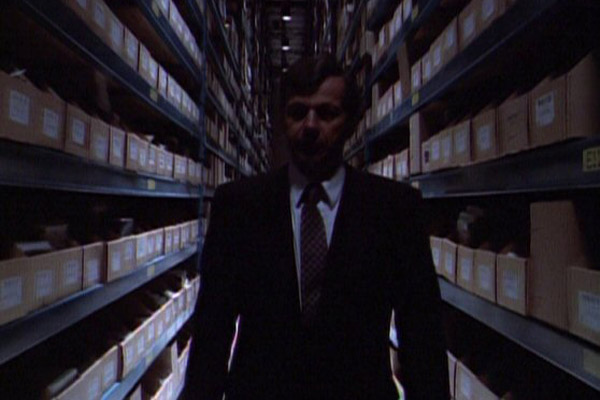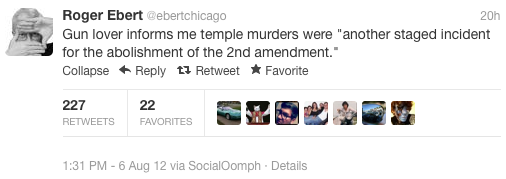
If you're one of Roger Ebert's near-700,000 followers (his Twitter feed is not quite as powerful as Reddit, but it's getting there), you may have seen this and been similarly surprised:

I like conspiracy theories as a form of American mythopoesis; you can learn a lot from the ones in circulation at any given time. It's as close as we have to classical mythology, the sense that our lives are governed by semi-irrational, not-omnipotent, decidedly non-benevolent higher powers that regularly play favorites. In that sense they're not an entirely insane response to the mysteries of life.
And the one Ebert received is common. Granted, "common" is a relative term; America is a big country, and people believe all sorts of irrational things, like the idea that David Stern fixed the 1985 draft for the Knicks (Jim Dolan and Isiah Thomas are obviously explaned by the irrationality of the classical gods). But this one was already present in the wake of the Aurora shootings, and before that the Fast and Furious scandal:
* "Two gun-related shootings involving government planted stooge; one more shocking than the other with the hopes of getting the American public to give-up their guns."
* "Potential echoes of 'Fast and Furious' can be seen in Holmes’ purchase of the weaponry utilized"
* "The fact that this event occurred while the UN is pressuring the US to basically blot out the Second Amendment leads me to believe this to be the case."
Etc., coming to a newspaper comment thread near you.
Much as I usually find conspiracy theories relatively harmless expressions of contemporary terrors, this one is unusually frustrating. The "Fast and Furious" scandal should be a critical part of the gun-control debate that's started to surface after the Aurora and Sikh Temple shootings. There's reason to be skeptical that achievable gun-control reforms would do much to prevent the latter, but the phenomenon that "Fast and Furious" was supposed to highlight and combat—extremely open gun laws that allow Mexican cartels to arm themselves through border-state gun sales:
"The United States is the easiest and the cheapest place for drug traffickers to get their firearms, and as long as we are the easiest and cheapest place for the cartels to get their firearms there'll continue to be gun trafficking," said J Dewey Webb, the special agent in charge of pursuing weapons traffickers in Texas at the US Bureau of Alcohol, Tobacco, Firearms and Explosives (ATF).
[snip]
According to the US Government Accountability Office, 87% of firearms seized by Mexico over the previous five years were traced to the US. Texas was the single largest source. The US attorney general, Eric Holder, told Congress last month that of 94,000 weapons captured from drug traffickers by the Mexican authorities, over 64,000 originated in the US.
The debacle that the Fast and the Furious investigation turned into became a distraction from the very real issues involved, ones that were given light and credibility by Katherine Eban's remarkable investigative piece for Fortune:
It was nearly impossible in Arizona to bring a case against a straw purchaser. The federal prosecutors there did not consider the purchase of a huge volume of guns, or their handoff to a third party, sufficient evidence to seize them. A buyer who certified that the guns were for himself, then handed them off minutes later, hadn't necessarily lied and was free to change his mind. Even if a suspect bought 10 guns that were recovered days later at a Mexican crime scene, this didn't mean the initial purchase had been illegal. To these prosecutors, the pattern proved little. Instead, agents needed to link specific evidence of intent to commit a crime to each gun they wanted to seize.
[snip]
Ten days after the meeting with Hurley, a Saturday, Jaime Avila, a transient, admitted methamphetamine user, bought three WASR-10 rifles at the Lone Wolf Trading Company in Glendale, Ariz. The next day, a helpful Lone Wolf employee faxed Avila's purchase form to ATF to flag the suspicious activity. It was the Martin Luther King Jr. holiday weekend, so the agents didn't receive the fax until Tuesday, according to a contemporaneous case report. By that time, the legally purchased guns had been gone for three days. The agents had never seen the weapons and had no chance to seize them. But they entered the serial numbers into their gun database. Two of these were later recovered at Brian Terry's murder scene.
The WASR-10 is a $600, Romanian-made, semiautomatic "starter" version of the AK-47; the expiration of the assault-weapons ban allowed them to be modified to accept 30-round magazines instead of 10. An intensive Frontline investigation traced how these weapons, popular among the Mexican cartels, make their way from Romania to Vermont to the Southwest to Mexico. One illiterate 19-year-old was caught by the ATF after buying 13 of them, for which he received $300-$400.
In terms of possible, practical impacts of gun-control reforms, border gun-running has a great deal of promise, much more than the difficult prospect of preventing mass shootings through gun legislation alone (the weapon used in Milwaukee was a simple 9mm handgun). But the Fast and Furious case quickly entered the realm of myth, and it will prove difficult to pull back.


